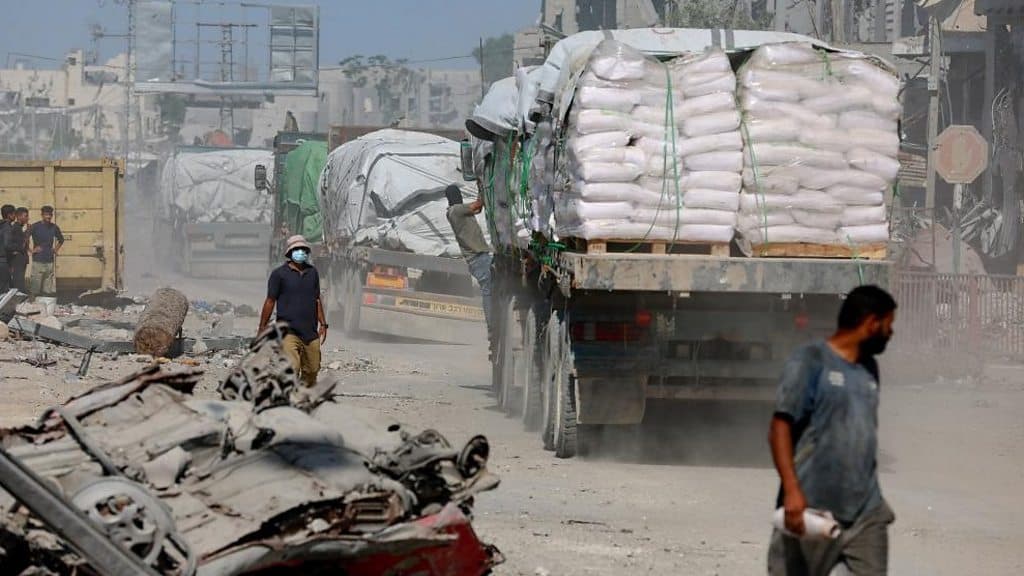We're loading the full news article for you. This includes the article content, images, author information, and related articles.
The identification of four deceased hostages returned by Hamas highlights the fragile nature of the ongoing Gaza ceasefire, impacting humanitarian aid efforts and drawing keen observation from Kenya on regional stability.

Israel has officially identified the bodies of four deceased hostages returned by Hamas on Monday, October 13, 2025, as part of the Gaza ceasefire agreement. The identified individuals are Guy Illouz, 26, an Israeli citizen; Bipin Joshi, 23, a Nepalese citizen; Yossi Sharabi, 53, an Israeli citizen; and Daniel Peretz, 22, an Israeli-South African dual national. Their bodies were returned to Israel for burial following forensic testing by the Israel Defense Forces (IDF).
This development comes amidst heightened tensions, as Israeli officials have indicated that restrictions on aid entry into Gaza and delays in reopening the Rafah border crossing with Egypt could occur. This is in response to Hamas's failure to hand over the bodies of 24 other deceased hostages as stipulated in the agreement. Israel's Defence Minister has warned that any delay or deliberate avoidance would be considered a gross violation of the agreement. Hamas, however, stated that identifying all burial sites could take time.
The return of the deceased hostages is part of a broader ceasefire deal, mediated by the United States, Qatar, and Egypt. This agreement also includes provisions for the release of Palestinian prisoners, the withdrawal of Israeli forces from populated areas, and the facilitation of humanitarian aid into Gaza. On Monday, October 13, 2025, Hamas released the remaining 20 living Israeli hostages in exchange for nearly 2,000 Palestinian prisoners and detainees held in Israeli jails.
The Israeli-Palestinian conflict has deep historical roots, with the establishment of the state of Israel in 1948 and the subsequent displacement of Palestinians. Kenya has historically maintained diplomatic relations with both Israel and Palestine, officially recognizing Palestinian statehood in May 1989.
Kenya's foreign policy on the conflict has consistently advocated for a two-state solution, aligning with United Nations resolutions. On Thursday, October 9, 2025, Prime Cabinet Secretary and Cabinet Secretary for Foreign and Diaspora Affairs Musalia Mudavadi welcomed the first phase of the ceasefire agreement, describing it as a vital step towards easing human suffering in Gaza. Mudavadi noted that this accord aligns with President William Ruto's position articulated during the 80th Session of the United Nations General Assembly in September 2024.
Kenya has also commended the United States, Egypt, Qatar, and Turkey for their instrumental roles in brokering the ceasefire deal, emphasizing the importance of international cooperation in restoring peace in the region.
Public opinion in Kenya regarding the conflict is divided. Some Kenyans, particularly within civil society and activist groups, express strong solidarity with the Palestinian cause, drawing parallels to Africa's own struggles against colonialism. Others view Israel as a crucial ally in counter-terrorism efforts.
The Muslim community in Kenya has actively raised funds for humanitarian support in Gaza. For instance, in June 2025, a coalition of Kenyan Muslim organisations pledged KES 5.4 million for an Udhiyah (Qurbani) programme to provide food to Gaza residents during Eid-ul-Adha.
The current tensions over the return of deceased hostages underscore the fragility of the ceasefire. Any breakdown in the agreement could lead to renewed hostilities, further exacerbating the humanitarian crisis in Gaza. For Kenya, continued instability in the Middle East carries implications for regional security and economic interests, particularly given its strong ties with both sides and its reliance on international trade.
The exact timeline for the return of the remaining deceased hostages remains uncertain, with Hamas citing difficulties in locating all burial sites. The extent to which this delay will impact the broader ceasefire terms and humanitarian aid access is also an ongoing concern.
The ceasefire, which began on October 9, 2025, has seen the initial exchange of living hostages and prisoners. The next steps involve the full implementation of all aspects of the agreement, including the complete return of all deceased hostages and unimpeded humanitarian access to Gaza.
Observers will be closely watching for further developments regarding the return of the remaining deceased hostages and the consistent flow of humanitarian aid into Gaza. The diplomatic efforts of mediators, including the United States, Qatar, and Egypt, will be crucial in ensuring the ceasefire holds and progresses towards a lasting peace. Kenya's Ministry of Foreign and Diaspora Affairs, located in Nairobi, continues to monitor the situation and advocate for a peaceful resolution.
Keep the conversation in one place—threads here stay linked to the story and in the forums.
Sign in to start a discussion
Start a conversation about this story and keep it linked here.
Other hot threads
E-sports and Gaming Community in Kenya
Active 9 months ago
The Role of Technology in Modern Agriculture (AgriTech)
Active 9 months ago
Popular Recreational Activities Across Counties
Active 9 months ago
Investing in Youth Sports Development Programs
Active 9 months ago